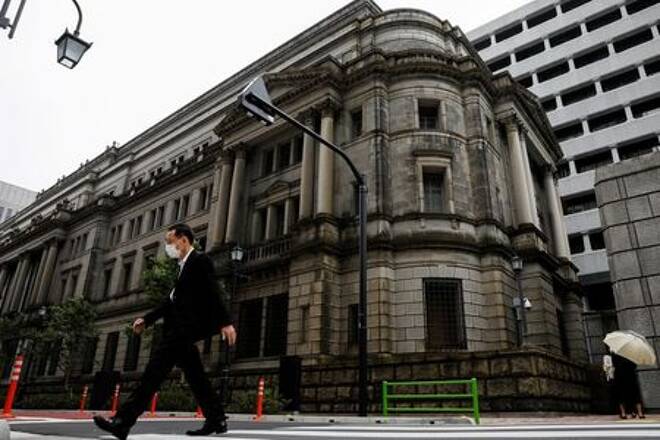Advertisement
Advertisement
BOJ May Start Debate on Retreat From Stimulus in 2023
By:
TOKYO (Reuters) -The Bank of Japan may be able to start debating ways to phase out its extraordinary stimulus programme, such as by ditching negative interest rates, in 2023, former central bank executive Eiji Maeda said on Thursday.
Such a move would put the BOJ in line with other central banks gradually eyeing an exit from crisis-mode policies. The U.S. Federal Reserve unnerved investors on Wednesday with indications it could begin raising rates in 2023.
Discussions on abandoning negative rates would only emerge if Japan’s economy returns to post-pandemic levels and inflation perks up near 1%, said Maeda, who as BOJ executive director oversaw its policy drafting until May 2020.
And if the central bank raises rates, it will only move the short-term rate target to around 0.0%-0.5% in what will be a modest reversal of crisis-mode policies rather than the start of a full-fledged rate-hike cycle.
“If the BOJ is lucky, debate (on raising rates) could begin from around 2023,” Maeda told Reuters in an interview.
“But this won’t be policy normalisation. It will merely be a shift away from an extraordinary stimulus towards a more sustainable monetary easing,” he said.
Any such moves would coincide with the end of Governor Haruhiko Kuroda’s term at the bank in April 2023, and would push it further from his policies aimed at propping up inflation with huge stimulus that kicked off with a “bazooka” asset-buying programme in 2013.
After Kuroda’s bazooka failed to fire up inflation to his 2% target, the BOJ shifted to yield curve control (YCC) in 2016 under which it sets a -0.1% target for short-term rates and caps 10-year bond yields around 0%.
Facing criticism for hurting bank profits with negative rates, the BOJ was forced in March to conduct a review of its policy tools to deal with the accumulating side-effects of prolonged easing.
Maeda, currently head of think tank Chibagin Research Institute, said the March review, which created a scheme to compensate banks for the hit from years of ultra-low rates, had helped extend the lifespan of YCC.
“With the review, the BOJ probably laid the groundwork for a post-Kuroda monetary policy,” he said. “YCC has been made sustainable for another three to five years.”
(Reporting by Leika Kihara; Additional reporting by Takahiko Wadao; Editing by Chang-Ran Kim and Richard Pullin)
About the Author
Reuterscontributor
Reuters, the news and media division of Thomson Reuters, is the world’s largest international multimedia news provider reaching more than one billion people every day. Reuters provides trusted business, financial, national, and international news to professionals via Thomson Reuters desktops, the world's media organizations, and directly to consumers at Reuters.com and via Reuters TV. Learn more about Thomson Reuters products:
Did you find this article useful?
Latest news and analysis
Advertisement
